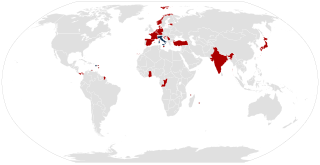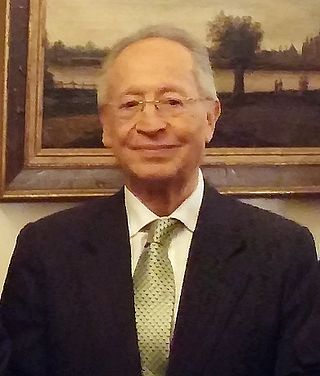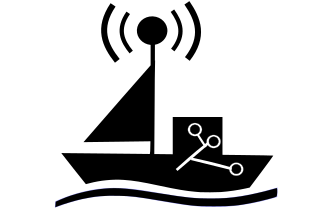
The International Maritime Organization is a specialised agency of the United Nations responsible for regulating maritime transport. The IMO was established following agreement at a UN conference held in Geneva in 1948 and the IMO came into existence ten years later,meeting for the first time on 17 March 1958. Headquartered in London,United Kingdom,the IMO,in 2024,has 176 Member States and three Associate Members.

The International Convention for the Prevention of Pollution from Ships,1973 as modified by the Protocol of 1978,or "MARPOL 73/78" is one of the most important international marine environmental conventions. It was developed by the International Maritime Organization with an objective to minimize pollution of the oceans and seas,including dumping,oil and air pollution.
The International Convention for the Safety of Life at Sea (SOLAS) is an international maritime treaty which sets out minimum safety standards in the construction,equipment and operation of merchant ships. The International Maritime Organization convention requires signatory flag states to ensure that ships flagged by them comply with at least these standards.
International Convention on Standards of Training,Certification and Watchkeeping for Seafarers (STCW) sets minimum qualification standards for masters,officers and watch personnel on seagoing merchant ships and large yachts. STCW was adopted in 1978 by the International Maritime Organization (IMO) conference in London,and entered into force in 1984. The Convention was significantly amended in 1995 and 2010 entered into force on 1 January 2012.

The World Maritime University(WMU),in Malmö,Sweden,is a postgraduate maritime university founded within the framework of the International Maritime Organization (IMO)—a specialized agency of the United Nations. Established by an IMO Assembly Resolution in 1983,the aim of WMU is to further enhance the objectives and goals of IMO and IMO member States around the world through education,research,and capacity building.
The International Association of Classification Societies (IACS) is a technically based non-governmental organization that currently consists of twelve member marine classification societies. More than 90% of the world's cargo-carrying ships’tonnage is covered by the classification standards set by member societies of IACS.

The IMO number of the International Maritime Organization is a generic term covering two distinct meanings. The IMO ship identification number is a unique ship identifier;the IMO company and registered owner identification number is used to identify uniquely each company and/or registered owner managing ships of at least 100 gross tons (gt). The schemes are managed in parallel,but IMO company/owner numbers may also be obtained by managers of vessels not having IMO ship numbers. IMO numbers were introduced to improve maritime safety and reduce fraud and pollution,under the International Convention for the Safety of Life at Sea (SOLAS).

Cokaliong Shipping Lines,Inc. (CSLI) is a shipping line based in Cebu City,Philippines. It operates both passenger and cargo ferries on eight routes in the Visayas and Mindanao regions and is one of the youngest shipping companies in the Philippines.

The environmental impact of shipping include air pollution,water pollution,acoustic,and oil pollution. Ships are responsible for more than 18% of nitrogen oxides pollution,and 3% of greenhouse gas emissions.

The Hong Kong International Convention for the safe and environmentally sound recycling of ships,or Hong Kong Convention,is a multilateral convention adopted in 2009,which has not entered into force. The conference that created the convention was attended by 63 countries,and overseen by the International Maritime Organization (IMO).

Efthymios (Thimio) E. Mitropoulos was the seventh Secretary-General of the International Maritime Organization (IMO),a United Nations agency. Mitropoulos was elected as Secretary-General on 18 June 2003 during the 19th session of the International Maritime Organization Council. His four-year term started on 1 January 2004,and then was extended until 31 December 2011 by the IMO Council on 9 November 2006. He was succeeded by Koji Sekimizu.

On 13 January 2012,the seven-year-old Costa Cruises vessel Costa Concordia was on the first leg of a cruise around the Mediterranean Sea when it deviated from its planned route at Isola del Giglio,Tuscany in order to perform a sail-by salute,sailed closer to the island than intended,and struck a rock formation on the sea floor. This caused the ship to list and then to partially sink,landing unevenly on an underwater ledge. Although a six-hour rescue effort brought most of the passengers ashore,32 people died:27 passengers and 5 crew. A member of the salvage team also died following injuries received during the recovery operation.
The Danish Maritime Authority is the agency of the Danish Government responsible for regulating and administrating Danish maritime affairs. The Danish Maritime Authority (DMA) is part of the Ministry of Industry,Business,and Financial Affairs. The Agency consists of the central authority and eight vision offices,including the office in Nuuk and the Centre for Maritime Health on Fanø. Its headquarters are in Korsør.
The International Code for Ships Operating in Polar Waters or Polar Code is an international regime adopted by the International Maritime Organization (IMO) in 2014. The Code sets out regulations for shipping in the polar regions,principally relating to ice navigation and ship design. The international framework aims to protect the two polar regions —the Arctic and Antarctic,from maritime risks. The Code entered into force on 1 January 2017.

Kitack Lim is a South Korean maritime official who served as a previous Secretary-General of the International Maritime Organization.

Autonomous cargo ships,also known as autonomous container ships or maritime autonomous surface ships (MASS),are crewless vessels that transport either containers or bulk cargo over navigable waters with little or no human interaction. Different methods and levels of autonomy can be achieved through monitoring and remote control from a nearby manned ship,an onshore control center or through artificial intelligence and machine learning,letting the vessel itself decide the course of action.

The Initial IMO Strategy on the reduction of GHG emissions from ships,or Initial IMO GHG Strategy,is the framework through which the International Maritime Organization (IMO) aims to reduce greenhouse gas (GHG) emissions from international maritime shipping. GHG emissions from shipping are about 3% of total GHG emissions,and under this strategy the IMO envisions their elimination within this century. However many companies and organizations say shipping should be decarbonized by 2050.
The International Code of Safety for Ships Using Gases or Other Low-flashpoint Fuels,often referred and abbreviated as the IGF Code,is the International Maritime Organization (IMO) standard for the use of gases as a fuel in maritime transport.

William A. O'Neil was a Canadian civil servant who served as Secretary-General of the International Maritime Organization and also served as Chancellor of the World Maritime University. He was the second-longest serving IMO Secretary-General.

Arsenio Dominguez is the Secretary-General of the International Maritime Organization (IMO),a specialized agency of the United Nations. He became the Secretary-General of the International Maritime Organization with effect from 1 January 2024,for an initial four-year term.















